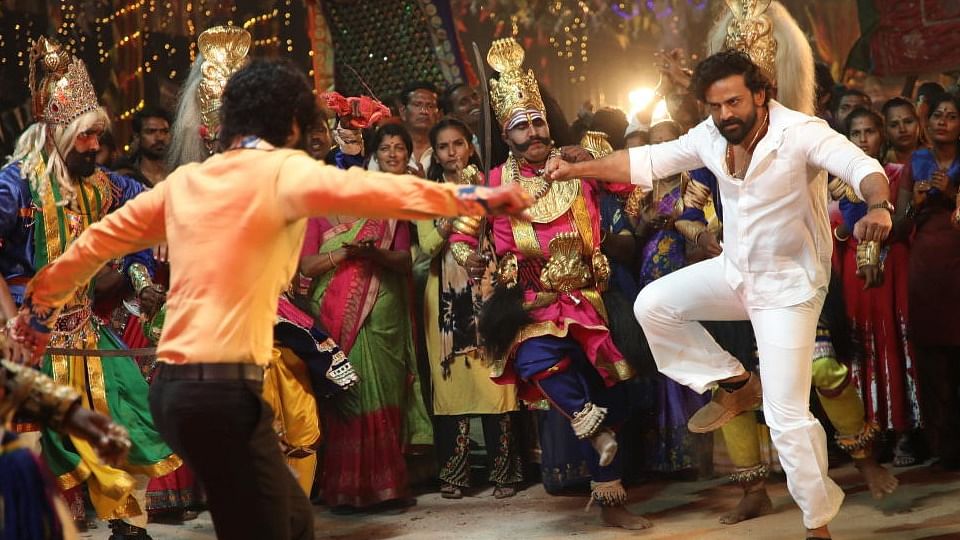
Kannada actor and producer Dhananjaya’s latest film Head Bush got caught in a controversy when a section of people objected to how Veeragase dancers were portrayed in the film. The actor, who agreed to mute two dialogues that spurred a row, denied that the film showed folk arts and traditions in poor light.
The actor spoke to Showtime on art being politicised, standing up for different causes and constructive criticism of films. Excerpts:
Amid the controversy, do you think depicting religious culture in cinema is a risky idea?
Culture is like a flowing river. It takes different shapes as time passes. In any art form, a complete authentic representation of culture is a challenge. It depends on a lot of factors, including the plot’s necessities. Karaga and Veeragase are traditions that are over 100 years old. So filmmakers need to be sensitive while handling such themes or else they can hurt the sentiments of people involved in these practices. When films do minor blunders in this aspect, informed people must guide filmmakers.
It’s wrong to view a movie only to find loopholes. Films must generate discussions but it’s not right to threaten an artiste or call for ban of movies. This kind of atmosphere affects the art and artistes. Filmmakers, going forward, might want to stay away from showing our culture considering it’s too sensitive a topic to touch.
We shouldn’t witness a situation where artistes are scared to depict our own culture. These kind of developments alienate our own people. It shouldn’t happen. Cinema must encourage inclusivity and no particular section of artistes must feel targeted ever.
Many believe that your outspoken nature might not have impressed a group of people. Based on the after effects of the episode, will you be apprehensive in voicing your views on important debates?
I am always game for discussions but they must not take different forms. For instance, me talking about issues might not lead to a great change but my idea is to generate a conversation. At the expense of my film facing a controversy, I am glad that there have been discussions about Veeragase, Karaga and also on how an art form must be viewed. People must understand and start thinking constructively.
I am definitely disturbed. One part of my mind tells me to just focus on commercial entertainers and stay away from unique attempts. I am now wondering if I should talk about anything apart from cinema. That said, I have always fought for my state and language. It’s sad that our opinions gets politicised. People turn opportunistic, using our words the way they want. I have always expressed whatever I feel without pointing fingers at anyone. However, I don’t want problems or controversies in my career. My complete focus will only be on cinema.
Are you overwhelmed by the support you got from the industry and people alike? How has the row affected the film?
First of all I don’t know how the episode started. If I committed a mistake, I wouldn’t have hesitated to apologise. I didn’t know there were so many supporters. It gives me more power to do good work. I also need to be more responsible as my supporters expect a lot from me.
The film’s first week collections have been good. My fans are those who buy tickets at the theatre and watch the film. So the demand for Head Bush might not reflect on ticketing sites or on social media, where you expect people to share film reviews. My fans watch my film, celebrate and share their thoughts with friends.
Nothing in cinema is secretive. If the box office collection was dull, the news would have come out. I don’t want to cash in on a controversy. That’s not how I think. My philosophy is that we have very less time in hand. After a film, we must move on. If it doesn’t work, we must digest the result and criticism and move on. One can’t win always. Once a film is out, its fate depends on people.
The phrase ‘badavara mane maklu belibeku’ (children of the poor must come up) spurred a movement of sorts. Your supporters used it as a slogan...
It’s a dialogue from my film 'Badava Rascal’. My point is, I came to take risks in the industry and people should be inspired by my journey. I am not talking just about economic status of aspiring artistes. I want all struggling artistes to rise and shine. People come from different backgrounds and not all of them get opportunities in the world of cinema. I came from a struggling, middle class family but today I am glad to have found success in cinema and love from people.